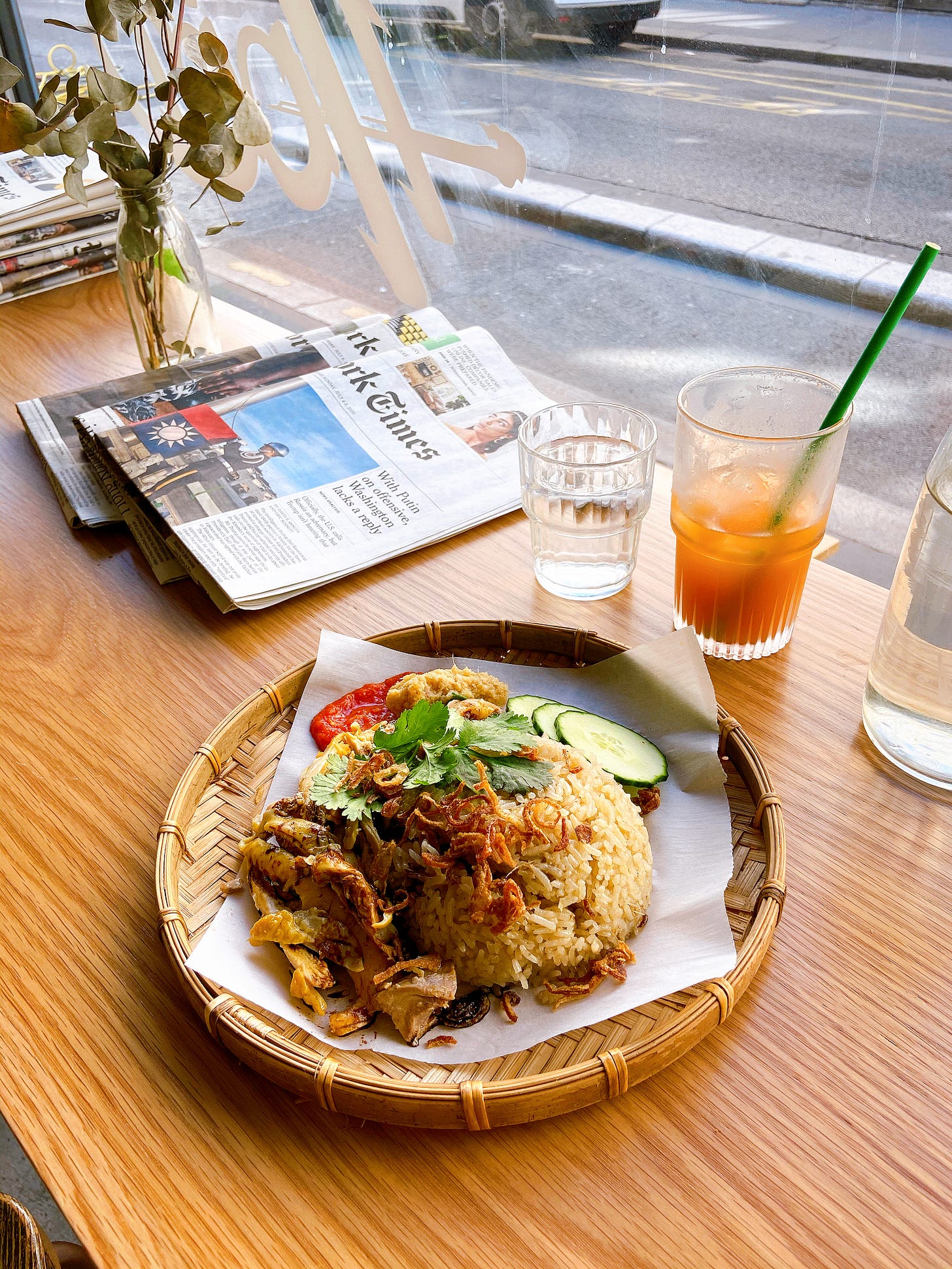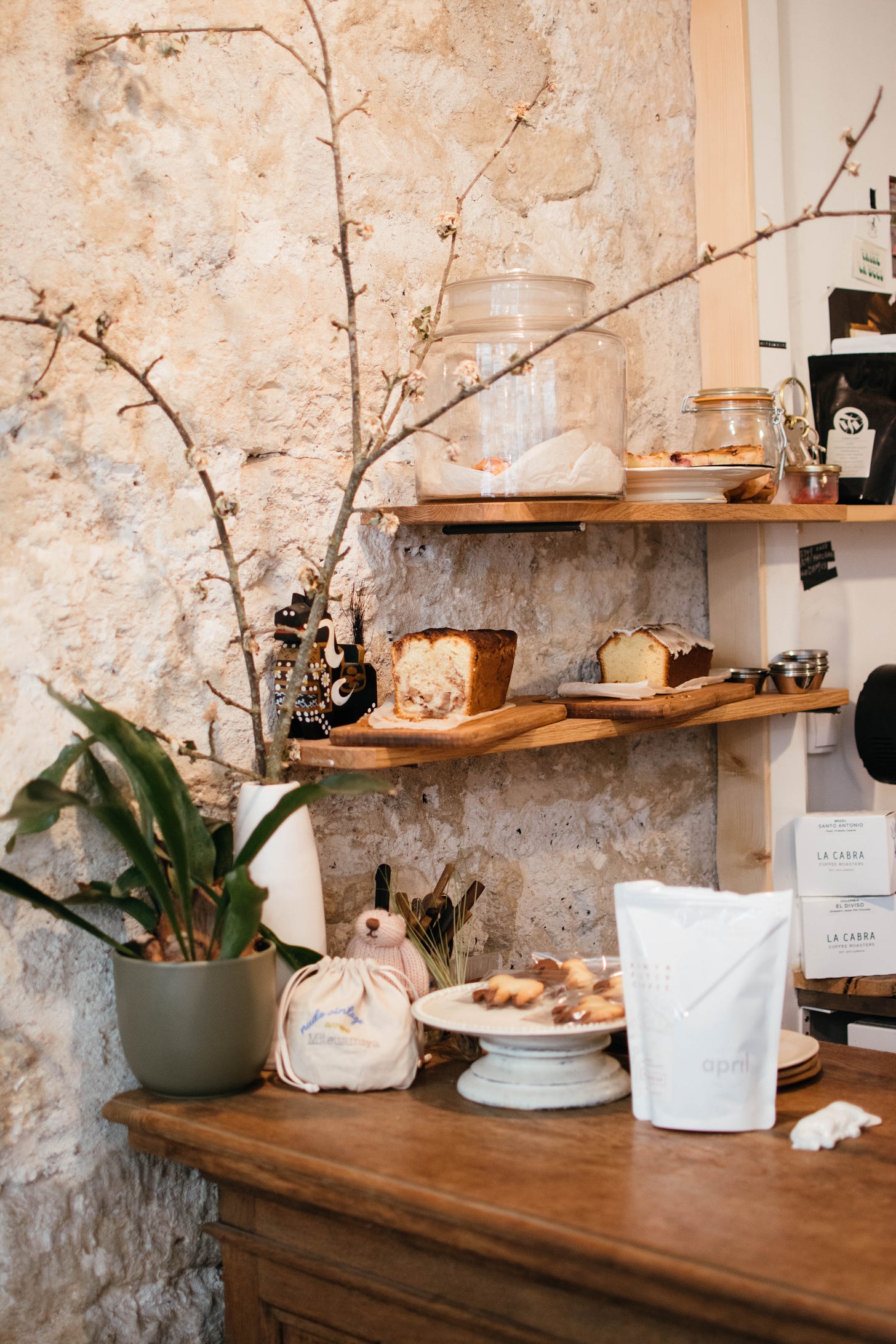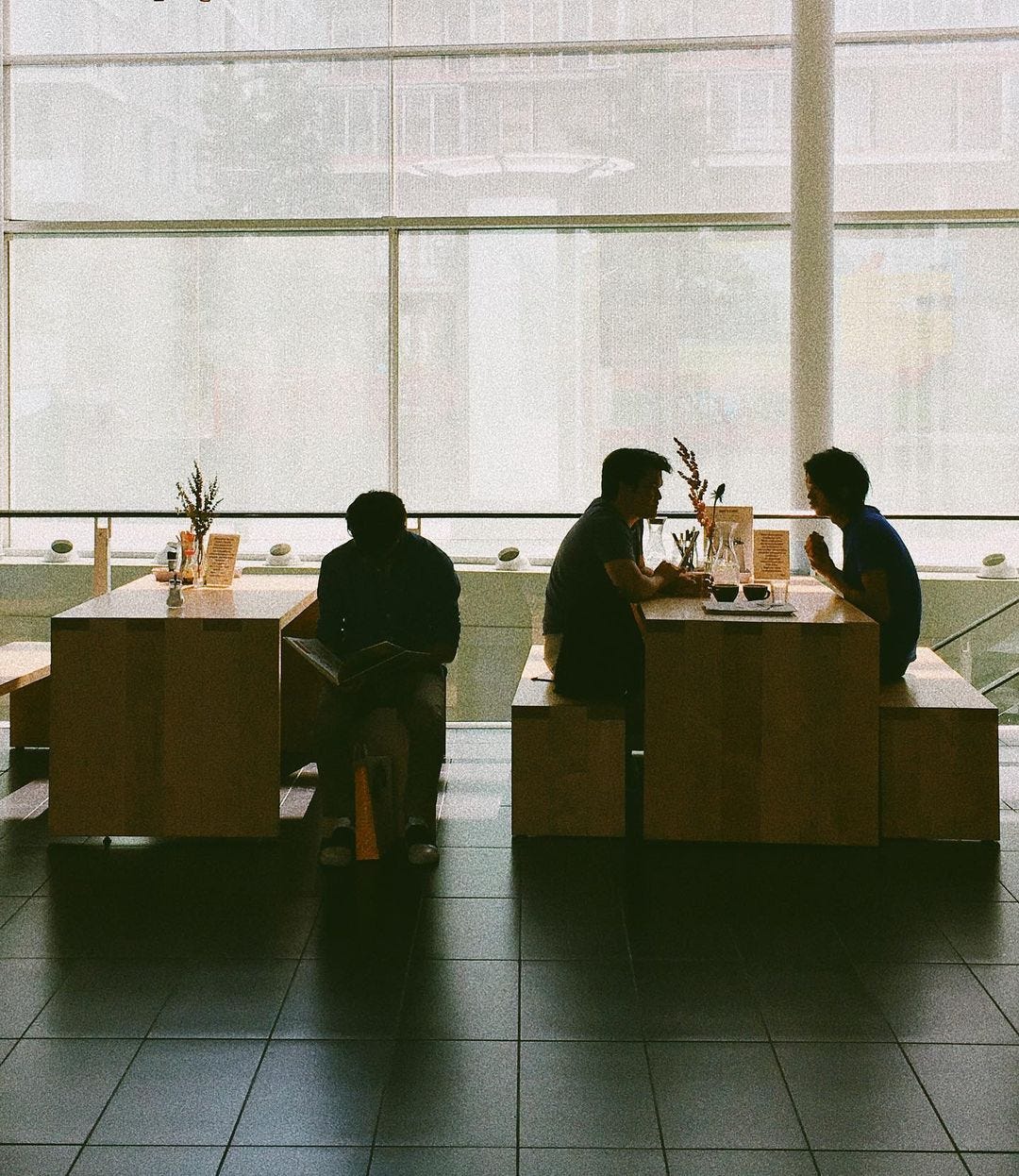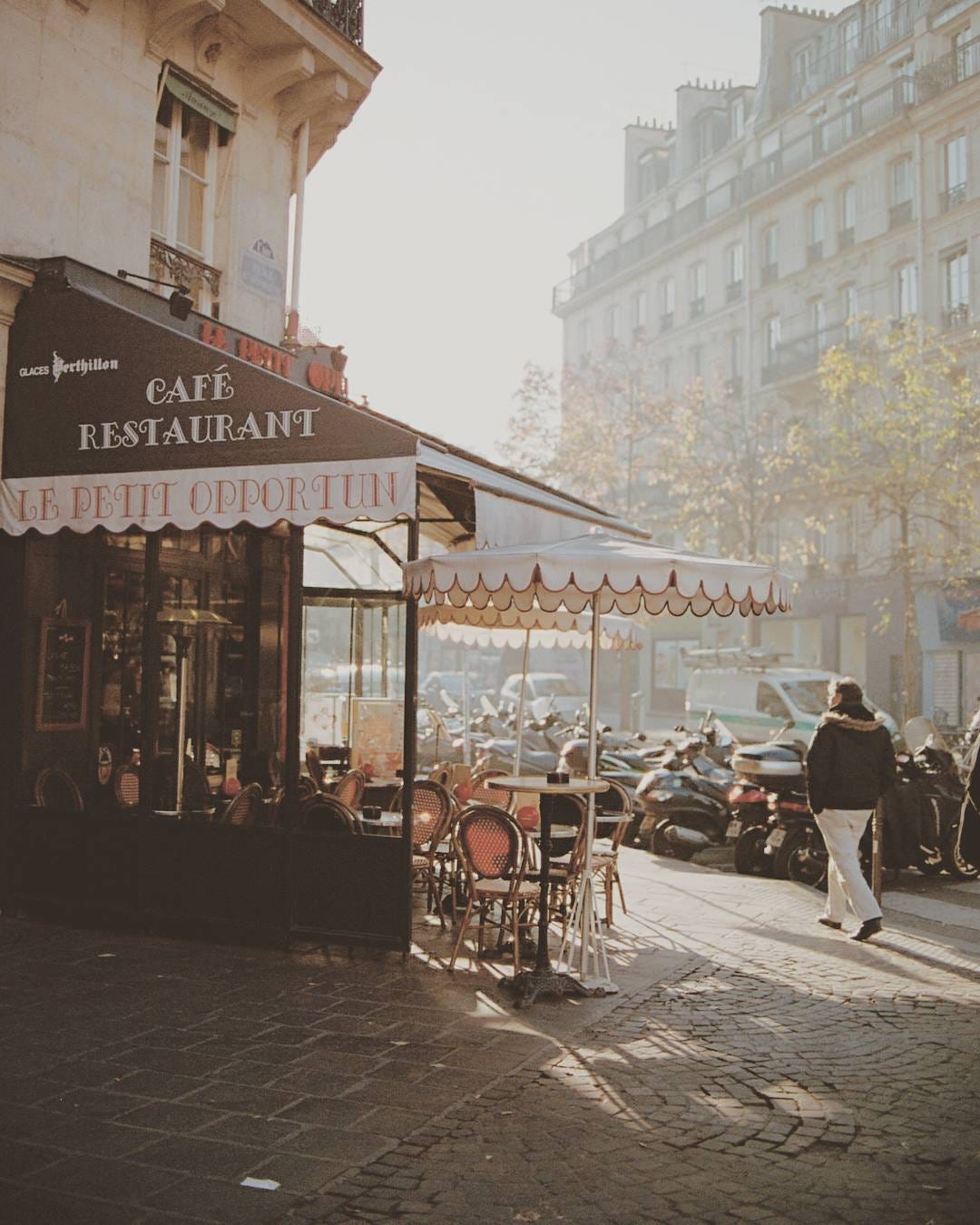4. an ode to the Parisian café and the 'non-essential'
what good is a café anyway, and what does it tell us about the French ?
dear friend,
If you were in Paris, we’d go to a café.
The one I’m thinking of is small — no larger than a teenager’s bedroom — and situated on a funny little street that drops off the Boulevard Voltaire, as if hiding itself from the Marianne at Place de la République.
Even more than most Parisian cafés, the space is wildly impractical. There are about five seats inside the café itself: rickety stools that double as tables, a small bench, and two chairs. The rest are out on the sidewalk, facing away from the powder-blue storefront where, in the era when no one knew what a coronavirus was, Parisians would sit resolutely, drinking their coffee in the winter cold (like I said — impractical).
But God, it’s something — a cottage in this manicured dollhouse of a city. A little piece of pre-industrial nostalgia somewhere in between Burgundy and Tokyo, with its uneven stone walls, delicate ikebana flower arrangements, and knick-knacks of old records and knitted teddy bears. Pre-pandemic, sensorial pleasures riffed off each other: the purr of the coffee machine overlaid with Neil Young’s gentle croon, the heady aroma of espresso, caffeinated conversations spilling into the street. As of writing, you can still get a coffee to-go, New York style. But this is Paris.
Subscribe for more letters about life in Paris 🇫🇷 💌 where no subject, from culture and food to politics and religion, is off limits.
In a time when cafés are deemed “non-essential” and constantly threatened by impending lockdowns… what good was the café, anyway? I started thinking about this after seeing a post on Dreamin Man’s Instagram in January. “2020 was a very challenging year for us”, it began, “but we were encouraged by all the people who support us”.
“We noticed many times that a café is not only a café: it has a variety of roles in society”.
*
In Paris, the loss of public spaces (cafés, restaurants, museums, theatres) has felt particularly catastrophic because Paris is built around the “non-essential” — the culture and cuisine that redeem the city’s disenchantments and give it its raison d’être. Yet among all the institutions that define Paris, the café, with its unique assumptions and functions, remains the city’s cornerstone.
Unlike other places, the café is first and foremost the domain of readers and writers. On the weekend, when friends and families brunch en masse, you might get a dirty look for taking up a table for two with Victor Hugo in livre poche, but on weekdays, the café is the refuge of the littéraire and those who are trying to be. For the (let’s face it) strenuous efforts of focusing on a non-smartphone object or trying to conjure up intelligible sentences out of thin air, the café rewards us with pleasure: caffeine, sugar, a splendid view. In Paris, there’s always something to see — a particularly thoughtful outfit, interesting character, affectionate dog. It’s a seat at the best theatre in the city for the price of an espresso.
But the café was more, wasn’t it — more than socially-acceptable drugs and pleasure. Behind each café lies a project, a philosophy that the café births and negotiates continually with its patrons, who give the place its soul and gradually make it their own.
For instance, some cafés have taken it upon themselves to preserve human and literary connection — values of a bygone era — by putting time limits on laptop usage or banning the devices altogether. Books are fine but, depending on the pettiness of the owner, tablets are not; once, while sitting in a rather posh café, I heard the owner demand that a customer put away his tablet only to have him respond by saying that he was reading. Here, the ambition is to cast the café as the modern Enlightenment salon: a cultural and intellectual forum for a particular 21st century aristocrat: the bobo. Similar to its 18th century antecedents, a vein of exclusivity runs through many of these cafés. Prices can be prohibitive, and some establishments feel downright cliquey: if you’re not a friend of the owner, you feel like you don’t belong.
Alternately, other cafés are animated by values on the opposite end of France’s political spectrum: inclusion and solidarité. To the north-east of Paris, in the grungier Ménilmontant neighborhood, you’ll find a café called Le Dorothy — named after the American journalist, activist, and Catholic Dorothy Day. Imagine if the Friends coffeehouse opened up to a neighborhood garden and the prices were slashed in half — 2 euros for a beer, 3 for a glass of wine, 1.5 for a coffee.
Of course, reasonably-priced libations are only a means to Le Dorothy’s real project: la fraternité. The café welcomes those in fragile social situations and offers administrative counsel, French lessons, and in some cases, temporary housing. Le Dorothy also organizes workshops around practical and impractical skills (the offerings include plumbing and… clowning), as well as conferences about ecology, philosophy, and faith. Reflection and working with your hands aren’t class-specific, the message goes — they are the vocation of all.
In recent years, the café has also become a Parisian experiment in multiculturalism: a place where Frenchness is renegotiated and where young baristas and chefs are expanding ideas about what we eat and drink in order to belong. In Oberkampf, an industrial, East Village-y neighborhood filled with bars and restaurants, there’s a café called The Hood headed by Khanh-Ly Huynh: a Franco-Vietnamese chef who won France’s MasterChef competition. In a 70s-inspired interior (burnt sienna bar tiles and apple-green walls), you can order coffee alongside Southeast Asian dishes like chicken rice, banh mi, nasi lemak, and a pillowy pandan chiffon cake — a menu rare in Paris altogether, not to mention in a café.
The community that has formed around The Hood and other cafés that take their influence from Japan, Australia, and Korea reflects a new generation’s ideals of Frenchness as cultural synthesis, of a Paris whose historical identity exists alongside an openness to the rest of the world. In France, la bonne nourriture, no matter its origins, can be a palatable way of easing the transition between who you were and who you are becoming.

And so the café is a cultural symbol — it tells us who we are as a people. In a 2016 essay, the literary critic George Steiner wrote that it was in fact the “idea of Europe” that emerged in the cafés criss-crossing the continent, whether in Paris or Copenhagen, Lisbon or Palermo. “The café is a place for assignation and conspiracy, for intellectual debate and gossip, for the flâneur and the poet or metaphysician at his notebook. It is open to all, yet it is also a club, a freemasonry of political or artistic-literary recognition and programmatic presence”. In the Paris of Voltaire, of Baudelaire, of Sartre and Beauvoir, of Hemingway, of Modiano… and of you and me, the café has been a constant presence, playing host to our joys and nourishing debates over how to remake our societies. Its ethos: of reflection and revolution, of pleasure, nostalgia, hope, and fellowship, is so essential that it often goes unnoticed — until it’s taken away.
So I wonder — as I write this not in a café, but in bed, swaddled in blankets — who are we when the cultural symbols that hold us together are gone? One of the promises of French socialism is that the pleasures that sustain us and elevate our lives: a coffee en terrasse, apéros with wine, bread, and cheese, art and literature, should never be out of reach, even for the most modest among us. The loss of these spaces of communion has felt so great that I sympathize with restaurant owners who, under the guise of civil disobedience, announced the illicit reopening of their establishments. The French take their pleasures so seriously that persisting in them — even those likely to cause premature mortality — is viewed as a philosophical act, a fulfilment of the existentialist exhortation to freedom. Last September, a friend invited me to a unmasked poetry reading in an underground restaurant that, he warned, was usually packed. “What about the pandemic?” I asked. He seemed to find my concern unenlightened. “Well… c’est la poésie,” he replied.
All of this — imprudent demands for “freedom”, a sense of entitlement to potentially deadly pleasures, a social fabric contingent on hours of caffeine and alcohol-fueled discussions — seem to make the French particularly unsuited for weathering a pandemic. This, and a strange intergenerational resentment that’s sprung up between the young and those who are older and at-risk for Covid complications. I’ve heard repeatedly, both from friends and French media, the sentiment that “one generation [the young] is sacrificing themselves [their freedoms, opportunities, social lives] for another”.
It occurred to me that although the café is many things, sacrifice it is not, at least for the customer. The magic of the café depends on how successfully it hides — behind the bar, the curtain leading to the kitchen, the descent down into the cave — the labor of the entire performance and the sacrifices that others make for our comfort. Last summer, when restaurants were open for indoor dining, my friend Alexandre commented on the strangeness of the entire system: the staff wore masks to protect their customers, but customers took off their masks as soon as they were seated, thus endangering the servers.
Absent the usual pleasures provided by those in hospitality, it feels incumbent on me — on us — to create togetherness in new forms, and with people we’ve perhaps neglected. Not being able to sit in a café, although socially tragic, is not “suffering” proper… but isolation, loneliness, and precarity are, and are affecting our neighbors in even greater measure than the virus. The café as a space and a symbol may be unavailable at present, but it’s the solidarity that represents the 1.5 euro espresso, the sacrifices that others have made for us and that we now need to make for each other, that show us who we are when other bearings are gone.
Sometimes, when it’s late at night, I’ll put on Tame Impala, lie in my bed, and think about what life was like before, when we inhabited the world and not just the space in between our walls. I think about bars on Rue des Lombards with freewheeling jazz and the astringent tang of beer and cigarettes, dance halls at Place des Fêtes that served white wine and grilled bratwurst, museums where I cried in front of amaranthine strokes of shadow and laughed so loudly I was almost kicked out by security.
But mostly, I think of cafés. The café at the corner of Waverly and Gay, where people read the paper in the morning shade of the brownstones and pagoda trees and struck up conversations with the person sitting across from them. The serene café in Beijing where writing traditional Chinese characters gives you a discount, the airy San Francisco café that makes the best almond croissant I’ve ever tasted. And the cafés in Paris, where I took refuge in matcha lattes between classes, pounded glasses of lemon-infused Perrier with friends, wrote pages of a bildungsroman, eavesdropped on conversations while pretending to read, recited poetry, fell in love.
until we can return, I remain, yours truly,
diana
Hello, and thank you for reading! If you enjoyed this letter, feel free to share it with a friend or write back below — I’d love to know how you feel about cafés and whether you're also missing their presence.
You can also subscribe for more letters about life in Paris 🇫🇷 💌 . We’ll talk about everything — whether it’s culture, food, and fashion or politics and religion, all subjects are worth exploring (see my first letter for a more complete intro and a bit more about me)! It’ll always be personal, and it'll always be honest. À la prochaine, friends.







